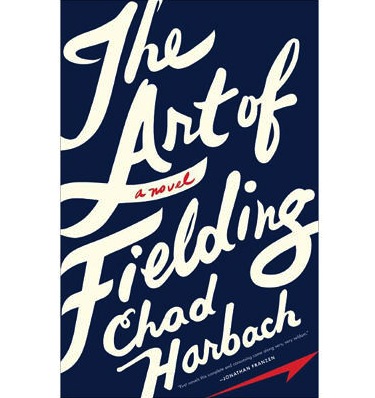
 The Art of Fielding is the first novel by Chad Harbach. It’s been acclaimed by all sorts of tastemakers and auteurs, including Jonathan Franzen and David James Duncan (The River Why, Brothers K), and John Irving, and the late great Herman Melville, too, if he could. It’s a story spun with the needle of discontent, with the palettes of characters simultaneously endearing and destructive, with circumstances both understandable and painfully dire. Set in the not-so-fictional, idyllic-but-not Westish College community, there’s the college president whose efforts never landed him where he thought he’d be, the prodigal daughter who spent her potential and never went to college, the all-effort, potential-achieving varsity captain with bad knees, a bad temper, and a sidelong addiction to pain meds–not to mention a fancy for poesy.
The Art of Fielding is the first novel by Chad Harbach. It’s been acclaimed by all sorts of tastemakers and auteurs, including Jonathan Franzen and David James Duncan (The River Why, Brothers K), and John Irving, and the late great Herman Melville, too, if he could. It’s a story spun with the needle of discontent, with the palettes of characters simultaneously endearing and destructive, with circumstances both understandable and painfully dire. Set in the not-so-fictional, idyllic-but-not Westish College community, there’s the college president whose efforts never landed him where he thought he’d be, the prodigal daughter who spent her potential and never went to college, the all-effort, potential-achieving varsity captain with bad knees, a bad temper, and a sidelong addiction to pain meds–not to mention a fancy for poesy.
And that just the tip of the iceberg when it comes to the misfits that make up the Westish Harpooners, a no-name AAA college baseball team replete with a pot-smoking scholar who reads with a booklight on his cap in the dugout, and the Davidic protagonist, Henry Skrimshander, the unassuming, unlikely, small-town nobody, who suddenly attracts the attention of pro scouts nationwide for his uncanny shortstop abilities. With the help of Harpooner Captain (Ahab), Mike Schwartz, Skrimshander slowly becomes the pro he needs to become, with protein pills, excessive stadium runs, batting practice. As he becomes the perfect baseball machine–artful beauty, mechanistic braun–Skrimshander collapses with one bad throw. Indeed, one error renders his entire record-breaking-reality a farce. Schwartz works to bring back the Skrimshander that amazed him years before, but the performance pressure reaches a boiling point. Here Mike tries to woo Henry back into his “old” self, his perfected image, by showing him a videotape of his fielding skills. A poignant example of how we try to keep life at bay, to defeat defeat, if you will, of the futility of machining our fates.
On a shelf in his office, Schwartz kept a long row of DVDs of Henry taking practice. Labeled and arranged by date, they formed a complete record Henry’s progress as a hitter under Schwartz’s tutelage, week by diligent week, from his freshperson season till now. Together they’d spent hundreds of hours watching these tapes, breaking down and rebuilding Henry’s swing frame by frozen frame. If you had the editing equipment and time to kill, you could take a frame from each day’s session and splice them together chronologically, so that the Henry who awaited the pitch would be skinny and indefinite, the bat wavering timidly above his bony right elbow, while the Henry who finished the swing, following through with such forceful purpose that the bat head wrapped around and struck him him between the shoulder blades, would be chiseled and resolute, his eyes hardened, his curls shaved down to a military half inch. The making of a ball player: the production of brute efficiency out of natural genius.
For Schwartz this formed the paradox at the heart of baseball, or football, or any other sport. You loved it because you considered it an art: an apparently pointless affair, undertaken by people with a special aptitude, which sidestepped attempts to paraphrase its value yet somehow seemed to communicate something true or even crucial about The Human Condition. The Human Condition being, basically, that we’re alive and have access to beauty, can even erratically create it, but will someday be dead and will not.
Baseball was an art, but to excel at it you had to become a machine. It didn’t matter how beautifully you performed sometimes, what you did on your best day, how many spectacular plays you made. You weren’t a painter or a writer–you didn’t work in private and discard your mistakes, and it wasn’t just your masterpieces that counted. What mattered, as for any machine, was repeatability. Moments of inspiration were nothing compared to elimination of error. The scouts cared little for Henry’s superhuman grace; insofar as they cared they were suckered-in aesthetes and shitty scouts. Can you perform on demand, like a car, a furnace, a gun? Can you make that throw one hundred times out of a hundred? If it can’t be a hundred, it had better be ninety-nine.
[youtube=http://www.youtube.com/watch?v=_71te7nhdXQ&w=550]

COMMENTS
Leave a Reply












